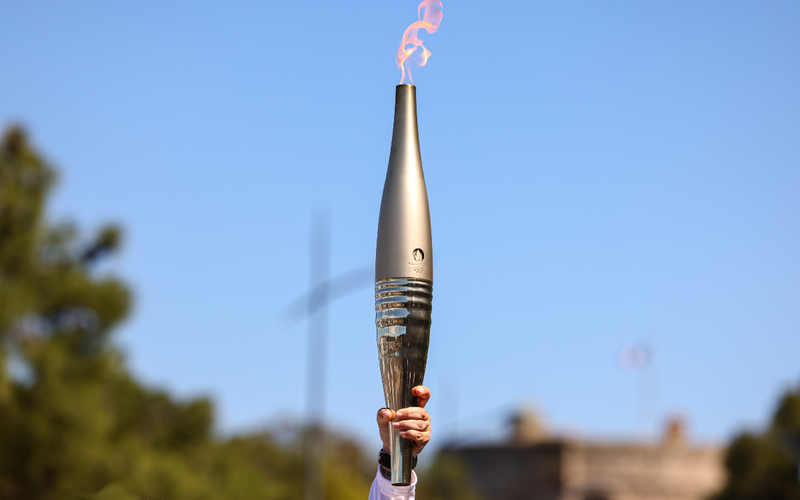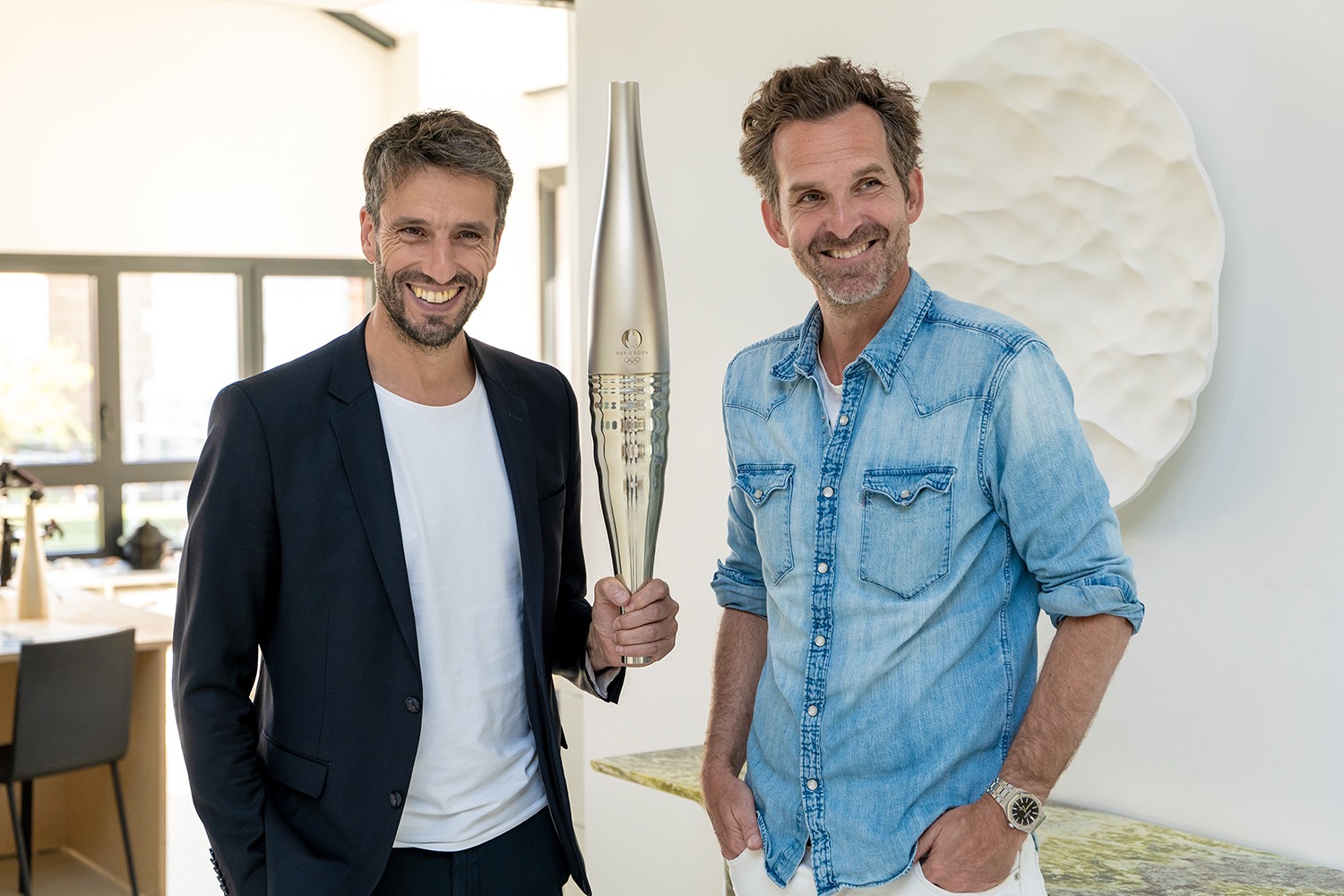Content
Cette page est aussi disponible en français
From May 8th to July 26th, the Olympic Torch Relay will pave the way for the Paris 2024 Games celebrations. The flame will make its way back to the capital on July 26 ahead of the opening ceremony. Find out when and where you'll be able to see it.
The Olympic flame, representing peace, unity, and friendship among nations, symbolizes the coming and the start of the Games. It unites all who gather to witness its journey, alongside the 10,000 torchbearers who are honored to carry it.
Parisian relay course
Access to the map, Here
Olympic torch relay on July 26
The route remains partly confidential, because it is part of the Opening Ceremony system!
After its departure in Seine-Saint-Denis, the flame will cross the Parc de la Villette (19th), then the Canal de l'Ourcq (19th) and the Canal Saint-Martin (10th) before joining the Seine for the final ceremony. Many activities are planned along its route.

After visiting the capital on July 14th and 15th, the Olympic Flame returns for the last time to Paris for the Opening Ceremony. Numerous events are planned along the way. Find out all about it!
For its Parisian route, the City and Paris 2024 have chosen historic, cultural, popular sites, sporting sites, major monuments and above all, places where Parisians live. The flame will travel through each arrondissement, showcasing every facet of the city.
Relay runners will also pass through places of remembrance, such as the Bataclan, the site of the 2015 terror attacks, historical landmarks like the Place de la Bastille and the National Assembly. It will also make it's way across squares like the Place de la Concorde and the Place des Vosges, and also working-class districts such as La Goutte d'Or or Belleville, or places undergoing urban transformation such as Porte de la Chapelle or the cycle paths of Rue de Rivoli. It will cross paths with places of worship such as Notre-Dame or the Grande Mosquée de Paris, cultural venues such as the Louvre or the Grand Rex, and finally woods, parks and gardens such as the Bois de Vincennes or the Buttes Chaumont. The relay will cover 31 kilometers on July 14th and 27.5 kilometers on July 15th.
Parisians will be able to watch the relay runners (120 per day in Paris) free of charge. Runners will be escorted to ensure that all safety conditions are met.
Olympic Torch Relay timetable
July 26
The precise route remains partly confidential, because it is part of the Opening Ceremony!
Basilica of Saint-Denis (Seine-Saint-Denis)
Pleyel district - Banks of the Seine (Saint-Denis)
Olympic Village (Saint-Denis)
Canals between Seine-Saint-Denis and Paris
Olympic Aquatic Center (Saint-Denis)
Stade de France (Saint-Denis)
Parc de la Villette (19th)
Banks of the Seine
More information on the Games visit: 2024 Games - Ville de Paris
List of locations by arrondissement
- Center
- 5
- 6
- 7
- 8
- 9
- 10
- 11
- 12
- 13
- 14
- 15
- 16
- 17
- 18
- 19
- 20
5th district
- Latin Quarter - The Sorbonne
- Pantheon
- Arab World Institute
- Pantheon
- Arab World Institute
6th district
- Senate - Jardin du Luxembourg
- Saint-Germain-des-Prés
- Saint-Germain-des-Prés
7th district
- National Assembly
8th district
- Champs-Élysées
- Arc de Triomphe
- Arc de Triomphe
9th district
- Olympia
10th district
- Place du Colonel-Fabien
11th district
- Bataclan
- Bastille
- République
- Bastille
- République
12th district
- Bois de Vincennes - INSEP
13th district
- Butte aux Cailles
- Open-air street art museum
- Open-air street art museum
14th district
- Place de Catalogne
15th district
- Aerial metro opposite the Eiffel Tower
- Jardin mémorial des Enfants du Vel' d'Hiv' (Vel' d'Hiv' Children's Memorial Garden)
- Jardin mémorial des Enfants du Vel' d'Hiv' (Vel' d'Hiv' Children's Memorial Garden)
16th district
- Bois de Boulogne - Fondation Louis Vuitton
- Cours Simone-Mathieu - Roland-Garros Stadium
- Cours Simone-Mathieu - Roland-Garros Stadium
17th district
- Statues of Mulâtresse Solitude & Alexandre Dumas
18th district
- Porte de la Chapelle
- Goutte d'Or
- Butte Montmartre
- Goutte d'Or
- Butte Montmartre
19th district
- Buttes-Chaumont
20th district
- Belleville
Paris Center
- Hôtel de Ville
- Rue de Rivoli
- Carnavalet Museum
- Shoah Memorial - Wall of the Righteous
- Maison de Victor-Hugo
- Notre-Dame de Paris
- Le Louvre
- Rue de Rivoli
- Carnavalet Museum
- Shoah Memorial - Wall of the Righteous
- Maison de Victor-Hugo
- Notre-Dame de Paris
- Le Louvre
Click on a district in order to get information.
An evening of festivities will close each day of the relay. During the night of July 14th to the 15th, the flame will remain on site at the Hôtel de Ville. It will set off again on the evening of July 15th for the rest of it's journey through the rest of France, returning to Paris on July 26th for the opening ceremony.
A torch with an innovative design
The torch, which will carry the Olympic and Paralympic flame, was designed by French designer Mathieu Lehanneur. It's 70 centimetres tall, with a width of 3.5 centimetres at each end, widening up to 10 centimetres in the center. It weighs 1.5 kilos and is made of recycled steel.

Tony Estanguet and Mathieu Lehanneur, the Torch designer.
Crédit photo :
Felipe Ribon
After being lit at it's historical site in Olympia, Greece, the torch will make French soil in Marseille on May 8th. It will arrive by sea aboard The Belem, a majestic three-masted schooner, finishing its journey on July 26th, with the lighting of the Olympic cauldron during the opening ceremony.
Three main objectives
The Paris 2024 torch relay will carry an enthusiastic message: "Finally! The Games are coming to France!" (Ça y est, les Jeux arrivent en France !)
The relay has three main objectives:
The relay has three main objectives:
-
Involving local communities and enabling as many people as possible to take part in the torch relay.
-
Showcase the diversity of natural and cultural heritage sites in mainland France and overseas, in line with the Paris 2024 principles of sustainability and innovation.
-
Promoting sport within society by mobilizing sports clubs and associations during the organization of the torch relay, but also by promoting France's regional diversity and the Land of Games 2024 label (Terre de Jeux 2024), which is strongly involved in promoting the role of sport for the french population.
An epic journey through France
The route of the Olympic Torch Relay was designed with the support of local authorities. Departments and territories participated in the choice of cities for Paris 2024. The organizing comity then made a selection of some fifteen meaningful sites (cultural sites, nature sites, sports sites, etc.), aligned with criteria for defining the route and vision of Paris 2024.
The torch relay will highlight the incredible wealth of our country: its heritage, its know-how, its natural landscapes, its museums, its live art shows… and, of course, its people!
One vision for sports
Although the Olympic and Paralympic relays do not take place at the same time, and the flames come from different sources, the former will include disabled torchbearers, and vice versa. Similarly, Paralympic sports will be highlighted during the Olympic relay, and vice versa.
The Paralympic flame's route will be unveiled in the coming weeks.
Key figures
64 territories involved
68 effective relay days in France
65 stopover towns closing the relay stage each day
Over 400 towns crossed
5 overseas territories crossed: Guadeloupe, French Guiana, Martinique, French Polynesia, Reunion Island
11,000 Olympic torchbearers
1 individual relay = 200 m = 4 minutes
3,000 torchbearers will take part in collective relays
1 collective relay = 24 participants (including a captain who carries the flame) = 8 minutes on average
35 federations involved in collective relays
68 effective relay days in France
65 stopover towns closing the relay stage each day
Over 400 towns crossed
5 overseas territories crossed: Guadeloupe, French Guiana, Martinique, French Polynesia, Reunion Island
11,000 Olympic torchbearers
1 individual relay = 200 m = 4 minutes
3,000 torchbearers will take part in collective relays
1 collective relay = 24 participants (including a captain who carries the flame) = 8 minutes on average
35 federations involved in collective relays
Get all the news on disruptions and opportunities
related to the Games with the Paris Infos Jeux 2024 newsletter.
We want to hear from you!
Was this information useful to you?
Please note: we cannot reply via this form (please do not include any personal information).
